When can a blood test determine gender? There is a way to find out the gender of a baby when the mom is eight weeks pregnant? They can do a simple blood test to figure it out. A blood sample is collected to inspect the DNA to determine the sex of the baby.
The best part is that this test doesn’t hurt or harm the mom or baby. It’s totally safe. They call it a non-invasive test, which means it doesn’t involve anything going inside the mom’s body. So, no worries there.
So yeah, with this blood test, they can find out if it’s a boy or a girl without any risky stuff. It’s a pretty amazing thing that doctors can do nowadays.
Keep reading to know the answers for the question such as “Can a blood test determine the baby’s gender?” and “How does the process of baby gender testing work?”
When Can a Blood Test Determine Gender?
As early as eight weeks into pregnancy, you can determine a baby’s gender. They do a simple blood test to figure it out. They collect a blood sample from the mom’s arm and inspect to check if there’s any unique DNA from the baby.
Here’s the cool part: Next Generation Sequencing is used to check for Y-chromosomal DNA. This type of DNA is only found in boys.
So, if they find this special DNA in the baby’s genetic material, it means the baby is a boy. If they don’t find it, it means the baby is a girl. They can even do this test if there are multiple babies.
Don’t worry, though. This blood test is safe for both the mom and the baby. It only costs $199, and you usually get the results within 7 business days.
One important thing to know is that they can only do this test if the mom is at least 8 weeks pregnant. That’s when they can detect the special DNA properly.
If the first blood sample doesn’t have enough DNA, they might need to take another sample about 2 weeks later.
The awesome thing about this baby’s gender blood test is that it’s really accurate.
And the best part? You can find out the gender much earlier than with the regular ultrasound exam, which is done later in pregnancy to check for any potential problems with the baby.
You can use this blood test to determine the gender of a baby.
What Are Blood Tests That A Doctor Can Do?
Back in the day, when there was a chance of some genetic issues or complications during pregnancy, doctors used chorionic villus sampling (CVS) and amniocentesis in the first trimester to check the sex of the baby.
These tests could give a pretty good idea about the baby’s genetic health, but they came with risks and were invasive, meaning they could potentially cause a miscarriage.
Because of these risks, doctors didn’t recommend these tests unless there were other important medical reasons.
However, one cool thing about them was that they could reveal the baby’s gender even before the 20-week ultrasound.
Luckily, things have changed now, and there are other options available for expecting parents. About a decade ago, researchers came up with a much less invasive test called cell-free DNA screening.
It’s pretty nifty because it can detect the baby’s DNA in the mother’s blood. With this test, doctors can check for common genetic conditions like Down syndrome, Edwards syndrome, and Patau syndrome.
If a pregnant person has a higher risk of these conditions, doctors usually suggest getting a cell-free DNA screening to find out the chances of the baby having any of them.
These days, more and more people can access these screenings. This way parents can get to know about their baby’s genetic health.
How Accurate Is the Blood Test for Gender Testing?

During an ultrasound exam, the person doing the ultrasound (called a sonographer) can try to tell the gender of the baby if the parents want to find out.
But here’s the thing – sometimes they can make mistakes. In fact, studies have shown that ultrasound results can be wrong around 10% of the time.
Why does this happen? All this depends on a several things. First, the ultrasound image needs to be really clear for the sonographer to see the baby’s gender correctly.
Sometimes an error can occur due the the bad quality of the image. Second, the sonographer’s experience and skill in interpreting the ultrasound also play a role. So it is essential to choose a skilled and experienced sonographer.
Oh, and here’s another important point – the baby’s position matters too. The sonographer needs a good view of the baby’s genitals to be sure about the gender.
So if the baby is in a tricky position or hiding those parts, it can make it harder to determine the gender accurately.
Ultrasound is not considered 100% accurate when it comes to determien the gender of the baby.
So, if you’re really excited to find out the gender, waiting for confirmation from a follow-up ultrasound or another reliable test is a good idea.
What is The Difference Between Baby Gender Test And Ultrasound?
The gender of a baby is actually determined right from the moment they are conceived, even before most women realize they are pregnant. Isn’t that mind-blowing? Let me break it down for you.
When a baby is made, they get their genes from both the mom and dad. The mom’s egg always carries an X chromosome, while the dad’s sperm can carry either an X or a Y chromosome. So, it’s like a genetic coin toss.
Here’s the cool part: the baby’s gender depends on which sperm cell, with either an X or Y chromosome, gets to the egg first.
If an X-carrying sperm wins the race and joins with the egg, it means it’s going to be a girl. But if a Y-carrying sperm is a champion, it means it’s going to be a boy.
Now, here’s the thing – even though the gender is decided right at the beginning, moms-to-be usually have to wait until their mid-pregnancy scan, around 16 weeks, to find out the gender for sure.
That’s because early ultrasounds, which are used to check on the baby’s development, aren’t always super accurate in predicting the gender.
It has shown the accurate results 90% of the times. So, it’s better to be patient and wait a little longer for a more reliable ultrasound, around 18 weeks.
So make sure you try to find the gender of the baby in the initial stage of the pregnancy. Keep in mind that it takes a bit time to get the results with an ultrasound.
It’s all part of the exciting journey of pregnancy.
What Is An Early Sex Blood Test?
There are some tests parents-to-be can take during pregnancy to get an idea about the chances of their baby having certain genetic issues. It’s pretty cool. Let me break it down for you.
There are two main types of tests: screening and diagnostic. Let’s start with screening.
These tests give an indication of the likelihood that the baby might have certain genetic conditions. They’re not 100% certain, but they can help give an idea. Some common screening tests include:
- Blood tests: They check the mom’s blood to see if there are any markers that could suggest the possibility of genetic issues in the baby.
- Prenatal screening for cell-free DNA: This one is a bit fancy. It looks at the baby’s DNA that’s floating around in the mom’s blood to check for specific genetic conditions.
- Special ultrasounds: These ultrasounds can give some hints about the baby’s development and if there might be any birth defects.
The other type of test is called diagnostic. These tests are more accurate and can give a definite diagnosis of a genetic condition.
If the screening tests show a higher chance of a problem, doctors might recommend these diagnostic tests. They might involve taking a small sample of cells from the placenta or the amniotic fluid.
It’s important to remember that screening tests can’t give a definite answer. If they show an increased risk, doctors will usually suggest diagnostic tests to be sure.
Also, these tests are done by healthcare professionals who can guide and support parents throughout the process.
So, these tests can help understand more about the baby’s health.
Different Types of Gender Blood Tests to Determine Baby’s Sex
Parents can use blood tests to find out the gender of their baby. These tests are usually safe and can be done early in the pregnancy. Let me explain a bit more about them:
Free Cell DNA Test
This test looks at tiny fragments of the baby’s DNA that are present in the mother’s blood. It can be done as early as the 7th week of pregnancy. It is a non-invasive test, doesn’t harm the mother or the baby. It’s about 95.4% accurate for boys and 98.6% accurate for girls. Besides gender, this test can also tell us about other important things like certain diseases or conditions the baby might have.
NIPT (Non-Invasive Prenatal Testing)
This is another blood test that helps screen for some conditions like Down syndrome. It can be done from around the 10th week of pregnancy. It takes a week or two to get the results.
Many parents find out the gender of their baby during a special ultrasound called the mid-pregnancy ultrasound. You can use it between the 16th and 20th weeks of pregnancy. Sometimes it gets difficult to clearly view the baby’s private parts so it gets difficult to predict.
Sneak Peek Early Gender Test
There’s also a test called Sneak Peek Early Gender Test. It’s a non-invasive test that uses the mom’s blood to check for the presence of male DNA. All they need is a little drop of blood from the mom’s finger.
Ramzi Test
Lastly, there’s something called the Ramzi Test. The position of the placenta or chorionic villi can help predict the baby’s gender as early as the 6th week of pregnancy. It has produced quite accurate results, but it is not always easy to do.
These baby gender tests offers many key information but we recommend to consult a doctor.
When To Have A Blood Test To Find Out The Sex Of The Baby?
A blood test can be used to determine the gender of a baby. Additionally, this test can help identify pregnancies that have an increased risk of severe genetic diseases.
It is particularly useful for pregnant individuals who have previously had a baby with a recessive disorder linked to the X chromosome or who are carriers of these disorders.
Recommendation
Why Parenting Styles Matter When Raising Children?
Naturally Increasing Your Breast Milk Supply
Tips For New Parents You Must Know
Overview of Your Abortion Options
Top 11 Best Orbeez Gun 2023 – Perfect Gift For A Child
The Perfect Easter Break Activities For You And The Kids
Active Gym Games That Will Cheer Up Your Kids
What is Breast Engorgement? How Can You Relieve the Symptoms?
Baby Nursery Rugs that Will Make a Hit out-and-out
Best Baby Car Mirrors – Keep an Eye At Your Baby While Driving
Natural Kids Hair Products For Healthy Hair & Scalp
Final Words by Fix The Life
In conclusion, a blood test can determine the gender of a baby as early as eight weeks into pregnancy. This non-invasive test is safe for both the mom and the baby, and it helps identify any increased risk of severe genetic diseases linked to the X chromosome. It’s an amazing tool that doctors use nowadays to provide valuable information to parents-to-be. So, if you’re curious about your baby’s gender or want to ensure their health, this blood test is a cool and reliable way to find out early on.




